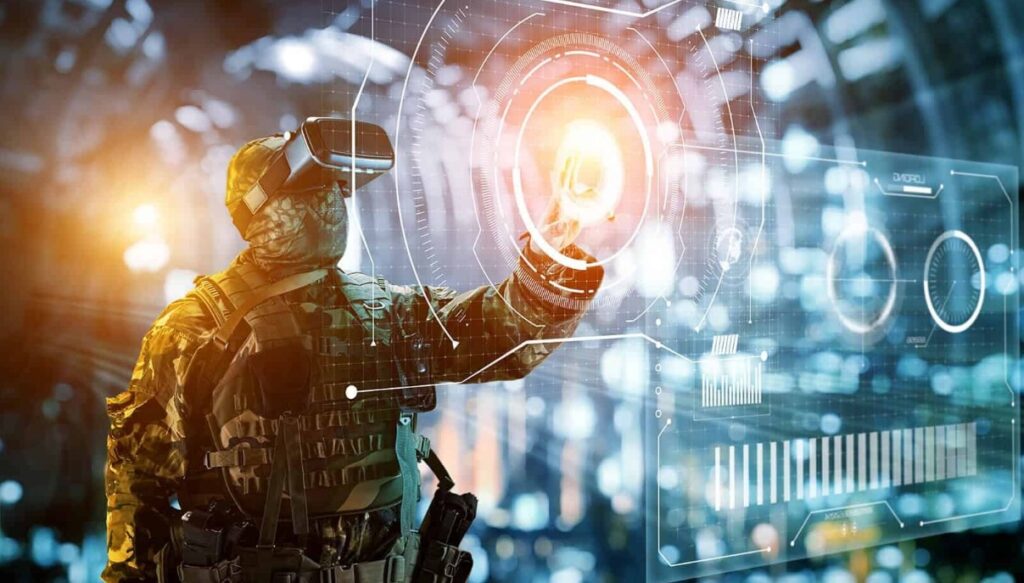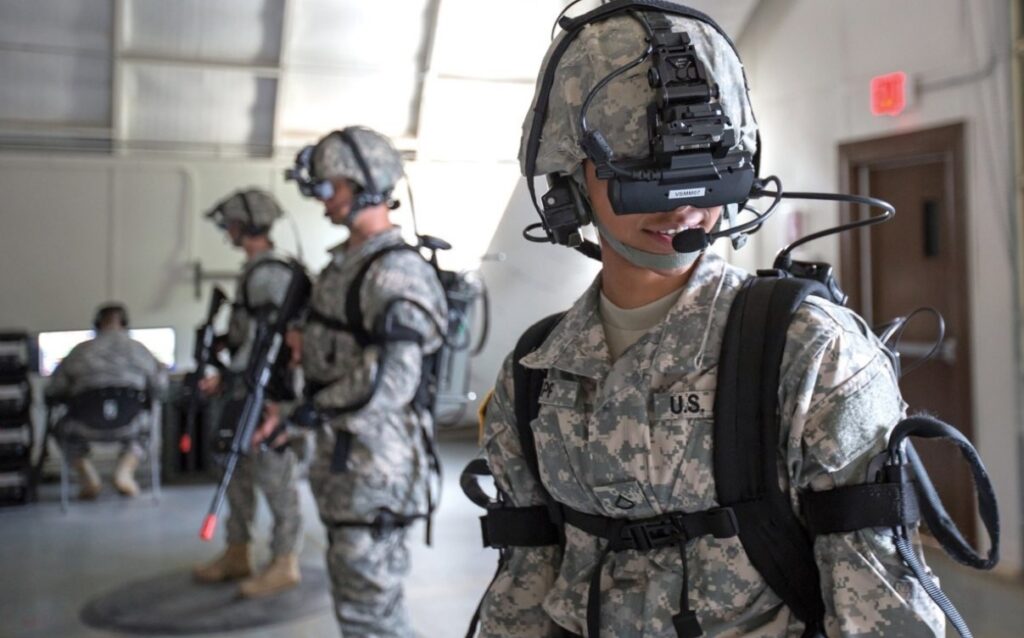AI In Military
Application of AI in military:
The role of artificial intelligence (AI) in the military is growing rapidly as countries around the world invest heavily in advanced technologies to enhance their defence capabilities. AI is transforming military strategies, from intelligent surveillance and autonomous vehicles to decision-making and cybersecurity.
By analysing vast amounts of data and executing tasks traditionally managed by human soldiers, AI can support efficient, data-driven decision-making while reducing human risk in combat situations.
This article examines the major applications of AI in the military, its importance, the impact on national security, case studies from countries leading in military AI technology, and answers to frequently asked questions.
Applications of AI in the Military
AI technologies are used across various military functions, offering advantages in terms of efficiency, precision, and risk mitigation. Key applications include:
Autonomous Weapons Systems Autonomous weapons can operate without human intervention, identifying and engaging targets using AI algorithms. Drones, robotic soldiers, and other AI-powered autonomous systems are being developed to support high-risk combat missions, enabling soldiers to stay out of dangerous situations.
Intelligence, Surveillance, and Reconnaissance (ISR) AI-powered ISR systems process vast amounts of data from various sensors to detect potential threats. By combining satellite imagery, geospatial data, and other intelligence inputs, AI systems help military leaders make faster, more informed decisions.
Cybersecurity and Threat Detection AI is essential for military cybersecurity, where it helps in threat detection, vulnerability assessment, and incident response. Machine learning algorithms detect unusual behaviour patterns that may indicate cyber threats, making military networks more resilient to cyber attacks.
Predictive Maintenance AI-based predictive maintenance systems monitor the health of military equipment, including aircraft, vehicles, and weaponry. By predicting mechanical failures before they occur, AI reduces downtime and maintenance costs while enhancing operational readiness.
Enhanced Decision-Making AI provides military decision-makers with insights derived from data analysis, helping them identify trends, predict enemy actions, and optimise battle plans. AI can model different scenarios, allowing for better strategic planning.
Training and Simulation AI-powered simulations provide realistic training environments, where military personnel can practice combat scenarios without physical risk. AI-driven training platforms can also adapt to the learning pace of each individual, ensuring they receive personalised training.
Logistics and Supply Chain Optimisation AI enhances military logistics by predicting supply needs, optimising delivery routes, and improving inventory management. This supports the timely supply of resources, especially in combat zones.
Drone Swarms AI-powered drone swarms are groups of drones that work collaboratively, using real-time communication and machine learning to perform complex tasks. Swarms can be deployed for surveillance, reconnaissance, or in combat to overwhelm adversaries.
Target Recognition Using image recognition and AI algorithms, target recognition systems can identify and categorise objects or individuals in battlefield settings. This technology aids in distinguishing between combatants and civilians, improving precision and reducing collateral damage.
Electronic Warfare (EW) AI plays a key role in electronic warfare by analysing signals and communications. It can jam enemy communications, detect and evade radars, and secure military communications.
Importance and Impact of AI in Military Applications
The adoption of AI in military applications provides several critical advantages, making it increasingly essential for modern defence:
- Enhanced Decision-Making Speed and Accuracy: AI reduces response times by processing complex data in seconds, enabling faster and more accurate decisions.
- Increased Safety for Soldiers: Autonomous systems, such as drones and robotic soldiers, allow militaries to deploy technology in high-risk areas, keeping human personnel out of direct harm.
- Cost-Effective Operations: Predictive maintenance and AI-enhanced logistics help reduce operational costs, ensuring resources are utilised efficiently.
- Force Multiplication: AI can enhance the effectiveness of smaller military forces, providing countries with the ability to project strength even with limited personnel.
- Cyber Resilience: As cyber warfare becomes a critical front, AI strengthens defences against cyber attacks, protecting military networks from increasingly sophisticated threats.
- Ethical Considerations and Challenges: The use of autonomous lethal weapons raises ethical questions around the control and accountability of AI systems in combat.
Case Studies: Countries Leading in Military AI
United States The United States has made substantial investments in military AI under the Department of Defense’s Joint Artificial Intelligence Center (JAIC). Projects include autonomous drone systems, AI-powered cybersecurity, and Project Maven, which uses AI to analyse video data from drone footage for target recognition. The U.S. is also exploring the integration of AI in predictive maintenance, electronic warfare, and enhancing battlefield decision-making capabilities.
China China has incorporated AI extensively into its military strategies, aiming to become the world leader in AI by 2030. The Chinese government’s “Next Generation Artificial Intelligence Development Plan” has prioritised military applications, including AI-powered drone swarms, autonomous submarines, and enhanced ISR capabilities. AI is also a part of China’s cyber warfare strategy, where AI tools are deployed for cyber threat detection and counterintelligence.
Russia Russia’s military AI strategy focuses on autonomous weapons, electronic warfare, and robotic soldiers. The Russian military has deployed AI-driven tanks, drones, and autonomous weaponry, including the Kalashnikov drone, designed for precision strikes. The Russian government has also integrated AI into military training, using simulations for combat readiness and strategy planning.
Israel Israel’s AI strategy emphasises homeland security, surveillance, and defence against regional threats. The Israeli Defence Forces (IDF) have integrated AI into drones, surveillance systems, and missile defence systems, such as the Iron Dome. AI-enabled cybersecurity tools are also critical to Israel’s strategy for defending against cyber attacks.
United Kingdom The UK’s Ministry of Defence has invested in AI for autonomous vehicles, cybersecurity, and decision support systems. The UK’s Defence Science and Technology Laboratory (DSTL) is working on AI algorithms for target identification, cyber defence, and logistics optimisation. The UK government has also created the “AI Lab” to develop ethical frameworks for the use of AI in military operations.
FAQ: AI in Military Applications
Q: How does AI impact military strategy and planning?
A: AI enhances military strategy by providing real-time data analysis, scenario modelling, and predictive analytics. These capabilities allow for quicker decision-making, better resource allocation, and more accurate risk assessment, ultimately leading to more effective military operations.
Q: Are autonomous weapons fully controlled by AI?
A: Autonomous weapons can operate independently, but most systems have human oversight, especially for lethal operations. Autonomous systems are designed to reduce human involvement in high-risk areas, but ethical concerns about their deployment remain significant.
Q: Can AI reduce military costs?
A: Yes, AI can reduce military costs by improving maintenance schedules, streamlining logistics, and optimising resource allocation. Predictive maintenance alone can significantly reduce equipment repair and replacement costs, while AI-driven logistics ensure efficient supply chain management.
Q: What are the ethical concerns regarding AI in the military?
A: Ethical concerns include accountability in autonomous weapon use, potential unintended consequences, and the risk of AI-driven escalation. AI’s ability to operate independently raises questions about responsibility in cases where AI actions lead to civilian harm or international conflict.
Q: How secure are AI systems against cyber attacks?
A: Military AI systems are designed with strong cybersecurity protocols to protect against cyber attacks. However, as AI becomes more integral to military operations, it presents a target for adversaries, making ongoing cybersecurity advancements crucial.
Q: Can AI-powered drones replace human pilots?
A: AI-powered drones can perform many functions traditionally handled by human pilots, especially in high-risk reconnaissance and combat missions. However, human pilots remain critical for complex and unpredictable situations where human judgement is paramount.
Q: What role does AI play in cybersecurity within the military?
A: AI in military cybersecurity detects and responds to threats by analysing patterns in data to identify anomalies. AI tools offer real-time threat detection, helping to protect military networks from cyber espionage and attacks on critical infrastructure.






















